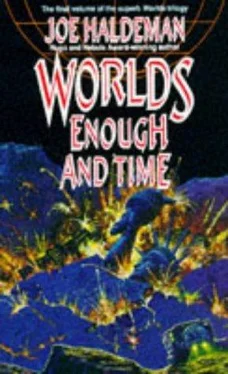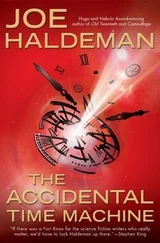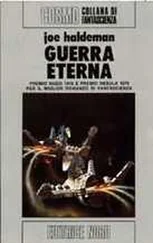Her first experiences with revisiting Earth through VR, back in New New, had been so depressing she’d had no desire to go back. But she knew more about the machines, now that she was in charge of them, and had learned how you could fine-tune them in various ways. She could mute the emotional input from the Earth files so they were little more than travelogues—though with all senses engaged; a total physical immersion. You were there , but detached. Whatever emotions you felt were your own, unamplified.
That was bad enough in some places. The shuttle pads at the Cape, where she’d said good-bye to Jeff. Las Vegas: knocked out, kidnapped, and raped while unconscious, then the rescue bloodbath. A bitter week in the Alexandrian Dominion, where being female reduced you to the status of a possession. Assault in New York. Spain, the Costa del Sol, warm winter sun and delicious sex—the paradise where she and Jeff caught the first worrisome hints that the world order was crumbling. Though no one thought of actual war, total war, that early.
Some places were quiet and pleasant; revisiting the Louvre, the Prado, the Salzburg Mozart Festival—or noisy and pleasant, like New Orleans and Rio during holidays. She walked alone through the Yukon tundra and joined millions in New Hong Kong.
She put a half hour each day in her schedule for this cybernetic journeying, one day to a place she had visited during her months on Earth, the next to a nearby one she had missed, as a kind of baseline for comparison. Nine tenths of the places were missing, but it was a big planet.
Most of her regular duties were shifted over to Gunter and Lebovski while she worked with Gail Bieda, a cognitive medicine specialist Morales sent up from PsychStat. Fortunately, the record of people’s past use, and misuse, of the machine was intact. It took only two days to sort them into three groups: those who could easily take an hour every ten days, those who definitely could not, and those who would need a slow adjustment.
Drawing on her own recent experience, O’Hara suggested they give everybody an hour on the machine regardless, but for some people, restrict a certain amount of it, or all of it, to the low-intensity mode O’Hara used in her Earth-tripping. That way, the amount of time one was allowed to use the machine wouldn’t become a status symbol. People could keep the actual information about their “VR level” secret, or lie about it.
Nagasaki and Sato okayed the plan, so O’Hara set up a standard message to put on every adult’s queue, explaining the situation and telling them what level they had been assigned. If they thought they’d been misclassified, they could take it up with PsychStat. The rest of the electronic paper-shuffling fell to Entertainment, trying to coordinate the work and leisure schedules of two thousand people, all special cases.
When everything was finally sorted out, though, there was still one machine not-so-temporarily out of service. O’Hara retained it as an unofficial perquisite of office for Cabinet members, so that they could avail themselves of VR retreat with a minimum of scheduling bother. It also allowed O’Hara to use it on the spur of the moment—“I have a free hour, the machine’s free; let’s go to London”—as she had become accustomed to doing. She told herself she would not abuse it, and for some time she didn’t.
1 January 2104 [23 Socrates 304]—I asked all of my crew to stay fairly sober last night, and had only two drinks myself, because I know what the park is going to look like. It’s not like the old days, when we could requisition 150 brain-dead GPs to pick up the mess after the party. That has now become an executive function. Of course it’s easier with no grass to hide bits of litter. No bushes to conceal copulators or lazy inebriates or, as happened once, a body.
The place was getting pretty scruffy when I turned in at one, and there were still several hundred people wandering around looking for something to break. But there were no emergency messages from Zdenek or Lewis when I woke up this morning, so I guess we were spared public lewdness or homicide.
The children were allowed to stay up until midnight, but most of them didn’t make it, including Sandra. (The creche parents wisely had them running and jumping all day.) Their pallets were lined up in an out-of-the-way corner by the fish pond, very orderly, but the kids just dropped at random, piled up snoring like a bunch of little drunks.
My not-so-little drunk poked me awake this morning with his persistent Alcoterm erection. It turns a man into a broomstick with but one purpose in life. Not the worst way to start the new year. It’s also his first day as Coordinator-elect, though; I hope the beast goes down before the afternoon meeting. Divert some of his bloodstream into the frontal lobes.
I wonder if other people were saddened by the size of the party last night. I guess people not professionally involved in crowd control might not have noticed how small the crowd was, compared to previous New Year’s Eves. I had to think of all those cryptos up in Level 4, though. Fastest Mausoleum in History, that’s us. Sylvine says it’s as reliable as any system aboard this boat—except for the 25 percent fatalities—but I look at our wonderful efficiency record in propulsion and information systems and am just as glad to be among the living.
Well, it’s 0745, and I guess I’d better be there before the rest of the crew, at least those who are also among the living this morning. Gunter didn’t look too good at 12:30, trying to cure his hiccups by standing on his head and singing “Die Gedanken sind frei.” It did seem to work, at least temporarily.
PRIME
New Year’s Day was the 112th day since the crops had died, and people were becoming accustomed to their new routines, forming new circles of friends, trying to get used to all the elbowroom. The extra space was uncomfortable for most of them, having lived all their lives unbothered by the forced intimacy of New New, Uchūden, or Tsiolkovski. The number of occupied rooms actually decreased in the first few months as people suddenly alone sought out roommates to argue with.
There were going to be more children. At least 1,400 cryptobiotes were going to die in the tanks, at the most optimistic estimate, so there would be thirty births each year to offset that future loss, plus ten or so to replace the “awake” people who will die during any year. That would also even out the age distribution over the next half-century, and provide fodder for aptitude induction.
For the first few months, O’Hara unexpectedly found herself with time on her hands. Part of it was because people were busy sorting out their new professional duties and personal lives. More of it was the fact that the type of person who normally took up most of her time was probably asleep upstairs: those with “minimal imperative function,” in Personnel’s euphemistic nomenclature. People whose primary job was to take up space and reproduce in hopes of chance improvement.
So she could allow herself a lot of clarinet practice and exercise, swimming and handball. There was also more physical labor connected with her job now. She lost 6.6 kilograms in 112 days, though that was probably diet as much as exercise. The yeast vats could produce substances that tasted like anything from asparagus to zucchini—or steak or lobster or alligator tail—but they all tasted just a little bit like yeast, which was not O’Hara’s favorite flavor.
There was also a lot of time for Sandra; more time than her creche parents wanted O’Hara to have. In a couple of years Sandra would turn eight, and O’Hara could opt to take the child home, to raise her according to whatever random unskilled method she came up with. Most creche parents would rather hold on to the children at least until puberty, which of course was only partly professionalism. If they didn’t become attached to their wards, they were in the wrong profession.
Читать дальше












